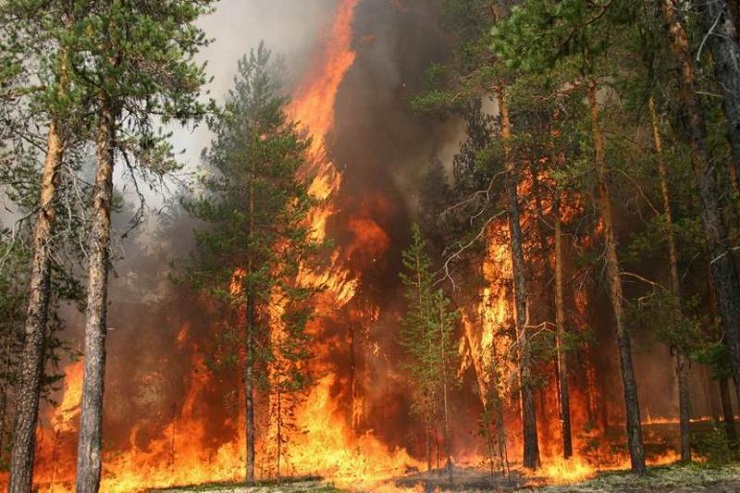In recent months, reports from various media on the manifestation of climate change in the world have become more like combat reports.
Forest fires happen every year, but experts believe it is now more intense, more frequent, and on a larger scale. Not only the Mediterranean is on fire: raging flames are destroying vast areas worldwide, from Russia to the United States. In Siberia, the fire is doing enormous damage to forests, and in California, a historic gold-digging settlement has already burned.
Fires have engulfed forests on the Italian island of Sardinia and northeastern Spain, and Turkey is burning. Natural fires in Greece continue to destroy forests and homes, obliterating dozens of hectares of land, reports France 3.
Russia faces the biggest forest fire disaster of this century. Greenpeace has counted 14.3 million hectares of burned forest area in Russia since the beginning of the year, the German newspaper Süddeutsche Zeitung notes. In addition to damage from fires, life becomes dangerous in some regions of Russia, where people literally lose ground from under their feet. It is well known that almost two-thirds of Russia’s territory has permafrost area, and climate change has affected them as well. The people who live there feel it: the pavement is sinking, and the houses are in danger of collapsing. The Ministry of Natural Resources and Environment of the Russian Federation estimates that by 2050, losses from melting permafrost could reach the equivalent of 57 billion euros.
As a result of the abnormal heat wave, the fire has spread to 14 districts of Algeria. The number of deaths is already estimated at more than 40 people, said Prime Minister Ayman Ben Abdelrahman.
The temperature in the open sun in Kuwait rose to 70 degrees (!) Celsius, with “only” 53.3 degrees in the shade. This extreme temperature increase is due not only to Kuwait’s tropical location and the seasonal Indian depression – a tropical cyclone in the Indian Ocean – but to severe climate change during the recent period.
Droughts have caused 650,000 deaths worldwide over the past half-century, and more than 577,000 people have died in storms. This data was published at the end of July by the World Meteorological Organization (WMO), a specialized agency of the UN. Regarding the economic damages caused by the catastrophes, the top ten economic losses caused by disasters include storms ($521 billion) and floods ($115 billion). Climate, weather, and water-related disasters caused 45% of all deaths and 74% of total economic losses related to disasters. Periods of heavy rain increasingly bear the mark of climate change; a warming atmosphere retains more moisture, leading to more precipitation during storms and increasing the risk of flooding.
July 2021 was the month with the highest global temperature since 1880, the US National Oceanic and Atmospheric Administration (NOAA) reported. This month also recorded significantly higher temperatures in parts of North America, Europe, South America, North Africa, Southern Asia, and Oceania. The cumulative temperature of land and ocean surface in July 2021 is about a degree above the figures recorded in the last century. In 2020, scientists from the Norwegian Polar Institute warned that in 20 years, there will be no ice in the Arctic in summer.
The functioning of a major system of ocean currents in the Atlantic, including the Gulf Stream, was disrupted by anthropogenic climate change, scientists said in a new study published in the United States. If this system collapses, it will lead to dramatic changes in weather patterns around the world, reports USA Today. In particular, it could cause severe cold in Europe and parts of North America, raise sea levels along the east coast of the United States and disrupt the seasonal monsoons that provide water for much of the world, wrote The Washington Post. According to The Guardian it will also endanger the Amazon rainforest and Antarctic ice sheets. Researchers studying ancient climate change have also found evidence that this system could stop suddenly, causing dramatic fluctuations in temperature and other abrupt shifts in global weather systems. The study was published on August 5 in the British journal Nature Climate Change.
Briana Abrahms, Assistant Professor at University of Washington, as reported by Qatar’s Al Jazeera, has gathered evidence that with further climate change, the likelihood of conflict between humans and wildlife populations is increasing, and it could harm both sides. As Abrams points out, we must act quickly before the problem takes on more significant proportions, and research in this area can keep us, people, and the environment safe from many risks.
The UN Intergovernmental Panel on Climate Change (IPCC) has published a report that in 20 years, the Earth’s surface temperature will rise by 1.5° C, and the fires, floods, and heatwaves occurring in different countries are the consequences of this global warming. The authors of the paper suggest that the main factor of these changes is human activity, so UN Secretary-General António Guterres called on countries to reduce greenhouse gas emissions into the atmosphere urgently and switch to renewable energy sources. He called on world powers to urgently do more to develop national plans to reduce atmospheric emissions during this decade, close coal-fired power plants, and stop exploring fossil fuels to switch to renewable energy.
Mass climate disasters should be a signal for all to change: it is necessary to spend more to protect against natural disasters, as their probability increases every year, emphasizes the German Die Welt. Climate change is leading to a rapid shortening of the growing season in Central Asia, says a new study that compiles vegetation cover data from the past two decades. Although the study refers to wild trees and grasses rather than crops, this trend could undermine hopes for increased agricultural production and heighten fears about food security.
Vladimir Danilov, political observer, exclusively for the online magazine “New Eastern Outlook”.
 RSS Feed
RSS Feed















 August 19th, 2021
August 19th, 2021  Awake Goy
Awake Goy 
 Posted in
Posted in  Tags:
Tags: 













